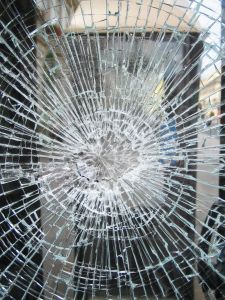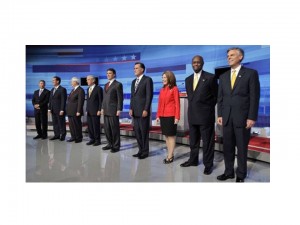Often times I’m confronted with a paradox. I have the desire to harm those that harm our society, yet I do not act—or at least, I do not actually physically harm them—out of some moral principle to not harm others. Sure, I might talk and write about them vindictively, even protest against them. But I never take action in preventing them from continually harming society. And I’m talking about people like Fred Phelps, Rush Limbaugh, Lou Dobbs, Glenn Beck, Sean Hannity, all of Fox News really, politicians (there’re too many to count), neo-Nazis, pedophiles, rapists, hypocritical evangelists of every faith. The list can get quite expansive. Essentially, though, the common denominator of all these groups of people, beyond the fact that they spread hate, bigotry, and idiocy, is that they don’t conform to my view of the world. They don’t see the world as a peaceful place of liberal ideals where we can all attempt to share the resources that we’ve been provided. They don’t like equality, they don’t like human rights; no, in fact, they only seem to idolize this religiosity of mean-spiritedness, elitism, and complete hatred.
I know beyond a shadow of a doubt that the world would be a much better place without each and every individual like this. Many, I know, feel this exact same way. To not admit that you have just a modicum of desire to see these aforementioned groups and people harmed would either indicate your naïveté or your complete lack of will.
So, what is it that prevents a collective group, acting on behalf of society, from going to their homes and beating them to a bloody pulp? –A simple answer would be mercy. A more complex one would be justice. But the origins of justice, and the justice or penal system, that we have in place is mercy, so it is mercy that we must dissect.
Mercy, of course, is diametrically opposite of punishment, i.e. a valuation of breaches of social contracts. We see punishment in antiquity, in which societies established societal codes, e.g. Code of Hammurabi, the Old Testament, and Roman law of the flesh, all of which dictated an “eye-for-an-eye” valuation on punishment. Thus, antiquity enforced a reciprocity method on how society meted out punishment. This idea, though, was then replaced, obviously, when the idea of mercy came along.
This we have to thank Christianity for. Jesus of Nazareth’s famous Sermon on the Mount established a penal code that we still see vestiges of despite the two-hundred ultra-secularization of thought. Jesus preached the ideas of “turning the other cheek”, “loving thy enemy”, and an overall peaceful solution to deal with societal behavior that was harmful. Now, this is not to say that society, either Christian or not, actually followed to a tee Jesus’ sermons and teachings. I could probably put Google on the setting ‘I’m Feeling Lucky’ and get hundreds of names of people who don’t follow the guidelines of mercy. But, on a general level, we can say with some degree of accuracy, that mercy is the predominant core of our justice system.
Now, instead of chopping off the left hand of a thief, we send him to prison, to “pay his debt to society”. He still keeps his hands, and other limbs, but we feel safe knowing that he’s in an institution that was supposedly established to reform his behavior. Yes, yes, I know, there are plenty of problems with our prison system in this modern age, but I beg of you to stay with me in trying not to deviate from the mental task at hand. Flesh has been replaced with concepts, and those concepts are rehabilitation, reformation, and credit.
But this has come at the price of our natural instincts. Our instincts, when we feel harmed, is to harm the perpetrator. This overcoming of our instincts is driven by main tenets of religious texts, of Christianity, Buddhism, Judaism, Islam, and on and on. Religion kills instinct, or at least serves to severely stunt it. Mercy is the byproduct of this death, and our subjugation is the ends to it. How, though, can instinct be killed by religion? —By making people believe it is just, righteous, and good to not exact punishment when a wrong is committed against the community. This, we have not been able to shake from our religious roots, no matter how secular we become.
Instinct is opposed to freedom, free choice, free will—or some variation thereof. Essentially, freedom operates as our enemy. Freedom says that while instinct may exist and man is a degenerative animal, we have a choice to overcome it, i.e. our instinct. And so we’re allowed to punish those that we see visibly harming our society by saying they had a choice, they could have not committed that crime, despite the fact that they very well might have been led by their instinct. All the while, a certain amount of subversive crime and corruption happens under our nose and we can’t do anything about, because we must show mercy. Freedom is the straitjacket of society that prevents us from exacting our instinct, and forcing us to use mercy.
Furthermore, freedom, whether you like it or not, is an invention of religion. No other society said man had the freedom to do as he wished before religion came about and said yes, we do have freedom; the freedom to choose mercy, justice, civil responses. Ancient Greeks had a keen sense of fate. Just look at their plays, poems, and other works of art. Oedipus Rex, Medea, Achilles, they all knew their fate and instinct, and what made them heroes was not because they somehow averted some great travesty, but rather because they played their role no matter the consequence. No apologies, no exceptions. That is what was robbed from humanity. That is what religion stole.
 We give criminals a “second chance” so that they might repay the damage they caused. Because that is what is fair. Fair and mercy go hand-in-hand. And with fairness comes a certain blindness. Justice, as depicted in statues and paintings, is always blind, and there is a reason for that. Justice must remain blind, for if she saw the rampant corruption and degeneration of society, then she would have no other choice than to condemn society into the darkness of an endless abyss of torture and punishment for our avarice, self-righteousness, and idiocy. But in her blindness, justice also fails. She fails to see more subvert forms of corruption. She fails to see unethical behavior being conducted behind doors, in dark alleys, and under the table. And those that are given the power to be the eyes of justice, i.e. lawyers, police, military, etc., they are human, all too human, and thus ultimately incapable or utterly corrupt to do anything about these more subversive forms of societal harm.
We give criminals a “second chance” so that they might repay the damage they caused. Because that is what is fair. Fair and mercy go hand-in-hand. And with fairness comes a certain blindness. Justice, as depicted in statues and paintings, is always blind, and there is a reason for that. Justice must remain blind, for if she saw the rampant corruption and degeneration of society, then she would have no other choice than to condemn society into the darkness of an endless abyss of torture and punishment for our avarice, self-righteousness, and idiocy. But in her blindness, justice also fails. She fails to see more subvert forms of corruption. She fails to see unethical behavior being conducted behind doors, in dark alleys, and under the table. And those that are given the power to be the eyes of justice, i.e. lawyers, police, military, etc., they are human, all too human, and thus ultimately incapable or utterly corrupt to do anything about these more subversive forms of societal harm.
Mercy, thus, becomes a mockery. Mercy becomes the tool in which we are manipulated to not obliterate the shackles imposed on society by those that preach its uses. While punishment can be used for harm and can lead to an eye-for-an-eye leaving the whole world blind, it can also be used to cut the bullshit. While Gandhi brought down the entire British empire with non-violence and civil disobedience, we must remember that the British empire failed not only because of Gandhi’s actions but because of their hubris and absolute near-sightedness in foreign policy. If they were to have taken Gandhi into a back room in the early 20th-century when he was a lawyer and just shot him before he developed his philosophy of satyagraha, then we would have never known of him and the British empire might still be strong.
The means to silence the people are a plenty, and they have the advantage because they know how to manipulate the people’s sensibilities of mercy, and they don’t care if they follow it themselves. Perhaps, though, the answer is not to simply use violence. For, as many of you are acquainted with this idea, violence begets violence in an endless cycle due to both habituation and rationalization. But action needs to happen. Action that has not been taken as of recently.
We’ve been left with the imperative: either exact punishment in the traditional sense of the word, or silence those that consistently harm our society. Would Fred Phelps have any effect if no one heard him? Would Rush Limbaugh poison the ears of thousands if no one tuned in? Would the politicians lie, cheat, and sell the people out if no one voted for them? Silence without mercy. Deaf ears without pity. The Voice is dead.
**Just a reminder: Taboojive does not condone any sort of violence whatsoever. This article, like the rest of our articles, was meant to spark discussion, perhaps even a few laughs. We’re here to provide a forum so you can say your piece. So, please do.
Mercy: The Salt in Wounds,





